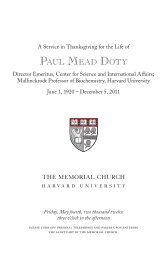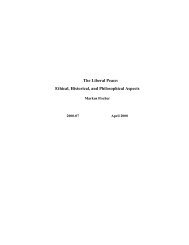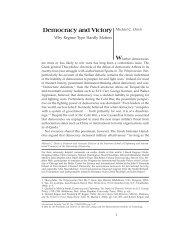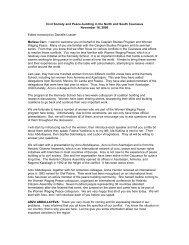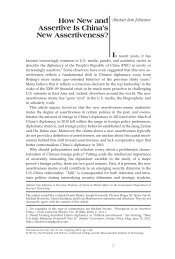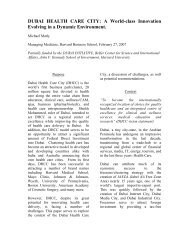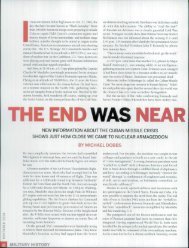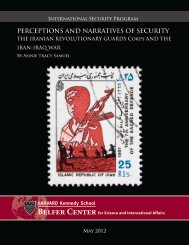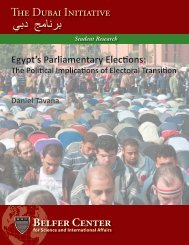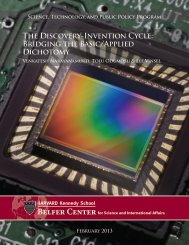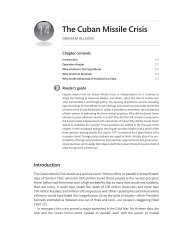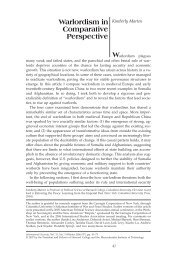The Cuban missile crisis and intelligence performance
The Cuban missile crisis and intelligence performance
The Cuban missile crisis and intelligence performance
Create successful ePaper yourself
Turn your PDF publications into a flip-book with our unique Google optimized e-Paper software.
Downloaded by [Harvard College] at 08:23 18 September 2012<br />
204 INTELLIGENCE AND THE CUBAN MISSILE CRISIS<br />
can do this, or that the body of theory that does the best job of helping us<br />
make sense of one puzzle may do a poor job, vis-a-vis some other body of<br />
theory, with respect to another.<br />
Without a positive theory of <strong>intelligence</strong> assessment, it is difficult to<br />
know how to go about constructing normative theory. Put another way, there<br />
can be no engineering without natural science. This is why it may be<br />
unfortunate that 'official post mortems of <strong>intelligence</strong> blunders inevitably<br />
produce recommendations for reorganization <strong>and</strong> changes in operating<br />
norms'. 92 Not only can we not be certain that we would have avoided one<br />
mistake had the organization <strong>and</strong> process of <strong>intelligence</strong> been different in<br />
the particular case at h<strong>and</strong>, but our tinkering may well induce other, possibly<br />
more serious mistakes in the future.<br />
What then, can we know in general about <strong>intelligence</strong> assessment, <strong>and</strong><br />
how can this knowledge help improve the <strong>performance</strong> of <strong>intelligence</strong>?<br />
Recognizing that there is a <strong>performance</strong> limit to <strong>intelligence</strong>, <strong>and</strong> that<br />
<strong>intelligence</strong> assessment is an art rather than a science, should certainly<br />
induce caution against lofty expectations. But there is one general<br />
phenomenon characteristic of human judgment <strong>and</strong> perception the greater<br />
appreciation of which can cultivate a useful circumspection in <strong>intelligence</strong><br />
assessment. Before closing, we will touch upon it <strong>and</strong> reflect upon how it<br />
might bear on practice.<br />
When Meno asked Socrates, 'How will you look for it ... when you do<br />
not know at all what it is?', he did not make the mere 'debater's argument'<br />
for which Socrates chided him. 93 Meno asked a profound question: how can<br />
we have knowledge of something without some prior familiarity with it?<br />
Once we allow some prior familiarity, we court infinite regress <strong>and</strong> the<br />
disturbing conclusion that knowledge is not possible at all. Socrates's<br />
solution — that all learning is mere recollection, for the immortal soul knows<br />
everything 94 - would seem on the face of it to substitute one paradox (the<br />
paradox of time) for another (the paradox of knowledge). In any case, the<br />
metaphysical presuppositions of Socrates's answer seem in no less want of<br />
justification than the answer itself.<br />
<strong>The</strong> paradox remains unresolved, though its contours <strong>and</strong> implications<br />
are now clearer, thanks to the efforts .of Gadamer, Quine, Chomsky, <strong>and</strong><br />
others. 95 For purposes of underst<strong>and</strong>ing <strong>intelligence</strong> assessment, the paradox<br />
is most enlightening when we throw it into reverse: we do hold certain<br />
beliefs (sometimes we like to call this 'knowledge'), <strong>and</strong> they do influence<br />
how we underst<strong>and</strong> new things. <strong>The</strong>re are many vocabularies to use when<br />
describing <strong>and</strong> exploring the phenomenon <strong>and</strong> many angles from which to<br />
look at it. Fischer describes it in the language of cognitive psychology, but<br />
we could just as well do so in the language of structural sociology,<br />
semiotics, cultural anthropology, or hermeneutics. 96



